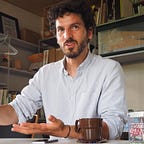Let’s go farming again, here and now.
Since I‘m back from my trip around the world, I have felt like farming for myself and forget about what the capitalist world is running for. But after a couple of tests, I now know I may not be able to sustain myself as a farmer. Nevertheless, I have discovered some beauty behind that muddy word.
Going on the path of farming, it eventually forced me to clarify what I meant by farming. What is that ideal and what is the kind of life I hear resonating behind this word? Since the beginning of using this word, I knew farming was more about a state of mind rather than only a peasant labor.
‘Farm’ comes from Middle English ferme, farme (“rent, revenue, produce, factor, stewardship, meal, feast”), from Anglo-Norman ferme (“rent, lease, farm”), from Medieval Latin ferma, firma, from Old English feorm, fearm, farm (“provision, food, supplies, provisions supplied by a tenant or vassal to his lord, rent, possessions, stores, feast, entertainment, haven”) — source wiktionary.org.
Before being that set of buildings that compose a farm in our beloved countryside, the term ‘farm’ first designated a right to farm, given from a land owner to peasants and workers, in exchange for a part of their harvest. A leasehold if you prefer. According to french version on Wiktionary, it is ‘attested in the anglo-saxon right since 1100’. In the modern english, the verb ‘to farm out’ remains with that meaning.
“AirBnb or Blablacar are kinds of farming platforms, transforming idle capacities into usable commodities.”
When I had my farm in mind, I actually was thinking about a place on Earth to borrow and where to grow enough to sustain. In other words, I was not looking to ‘produce commodities for their exchange value’ but rather ‘transform idle capacities into usable commodities’. Usable meaning mostly eatable.
Before traveling, I had been involved a bit within the nascent collaborative economy thinking, and harvesting the idle capacities was one of the features I thought could help make a better use of our sapce and materials. After digging a bit further into that part of the collaborative economy — behind this word there are now many other aspects — I felt like AirBnb or Blablacar are kinds of farming platforms in their idea, transforming idle capacities into usable commodities, that are then exchanged for money.
An other aspect of farms is that it carries the notion of circular economy. Farms are not emant to be isolated self sustainable businesses, but rather transformation capacities whithin a network of farms. And the one harvesting apple will sell or barter some to one in order to get straw from an other one.
“When you operate a knot of a productive network you take for limited, it makes quite some sense to care for that collective productive ressource”
Unlike our urban homes, ungrounded capsules dependants on networks of energy, water, entertainment, information, garbage and wastes they are plugged onto, farms are interconnected cottages, distributed makerspaces, local storages and know-how networks. That idea behind the farm made me feel that my urban nest was lacking some local ground and freedom to make — this is why I have eventually co-founded WoMa, a cooperative workshop in Paris.
A farm is a unit of transformation in a circular economy model, quite different from a production facility in a linear capitalist model. No wonder that the idea of common elaborates in our Western imagination from such circular economy actors. When you operate a knot of a productive network you take for limited, it makes quite some sense to care for that ‘collective productive ressource’, as Dr Harry Walker would phrase it.
In the end, the more I follow that path of the Farm, the more I realize its potential away from the fantasy of the countryside autarkic cottage. The ‘right to farm’ sounds to me like a nice stand, as the right to experiment and transform what you are given, while being at the same time a duty to care for and sustain the active elements that balance such climate. So where ever we live, whatever our job is, let’s keep farming.
